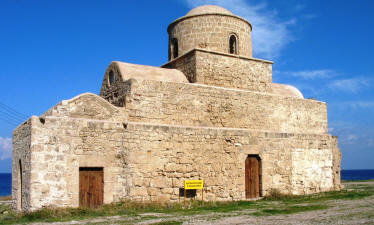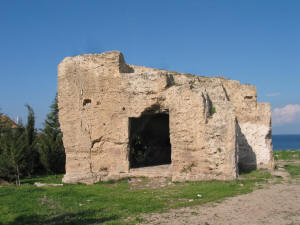St Evlalios & St Evlambios Churches
Alsancak, Near Kyrenia, North Cyprus
 |
| St Evlalios Church |
The churches of St Evlalios and St Evlambios share the Lambousa peninsula with the monastery of Akhiropiitos.
 |
| Mosaics Outside the Church |
The 16th century church of St Evlalios is dedicated to the first bishop of Lambousa, and is built on the remains of an older church. The history of the church is parallel to the monastery, in that it was built in the 6th 9th and 12th centuries.
The surviving church with a Franco-Byzantine style was erected by Archbishop Neophytos in the 16th century. It was obviously once part of a much larger complex, as evidenced by unexcavated mosaics on the seaward side.
 |
| St Evlambios Church |
Inland from the church of St Evlalios is the rock chapel of St Evlambios. This structure is the remains of an ancient quarry, and is carved from a single block of limestone. It was turned into catacombs in the late Roman period, and is where the body of Evlambios, an elderly martyr was interred.
In 1902 a number of silver and gold objects from the Byzantine period were discovered here, and these have become known collectively as the Lambousa Treasure. It is thought that the objects date from between 627 and 630, and may have been buried in order to protect them from raids carried out by the Arabs. However, these finds were sent off and split between various museums, including the Medieval Museum in Limassol, the Metropolitan Museum in New York and the British Museum in London.
To reach the churches, take the coast road from Girne towards Lapta. Around half a mile after the turning for Alsancak, look for a road on your right signposted to the Camelot beach complex. You will also see the signs for the churches. Before reaching the Camelot car park turn left on to the peninsula, and you will see the church of St Evlalios ahead of you. Remember, although you are on a public area, you are on the edge of a military area, so take care where your camera is pointing.
See the location on Google Maps
Back to Kyrenia index.